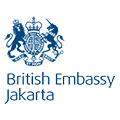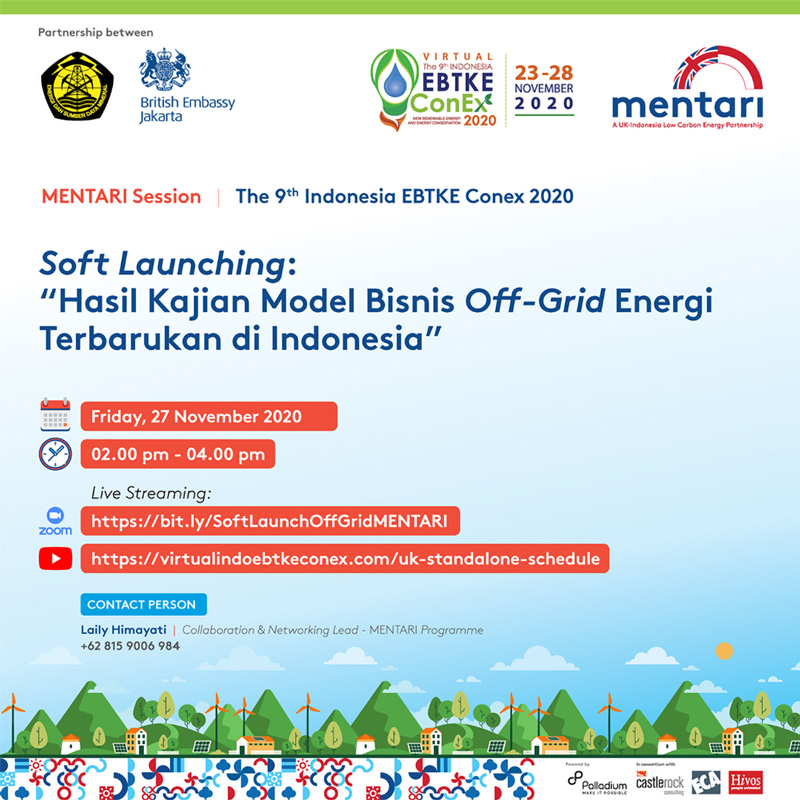From the Study Result of the Renewable Energy Off Grid Business Model:
MENTARI Offers a New Model of Off Grid “Franchise” Business to Accelerate Remote Area Electrification
Jakarta, 27th November 2020- The MENTARI program (Towards a Low Carbon Energy Transition in Indonesia) recommended the off-grid business franchise system as a solution to accelerate electrification in remote areas, particularly in Eastern Indonesia. The business model is also considered to be more effective when facing challenges related to the business area owned by the State-owned electricity company (PLN), information on electrification plans at the village level by the government, and the rules on providing subsidies for other utilities have also been clear and transparent.
It is the conclusion of “The Study on the Renewable Energy Off-Grid Business Model” launched on Friday, 27th November 2020, on a series of conference and exhibitions “The 9th Indonesia new and renewable energy (EBTKE) Virtual Conference and Exhibition 2020” which took place virtually from 23 – 28 November 2020 in Jakarta. The soft launching of the study was directly handed over from Energy and Mineral Resources Ministry director general for new and renewable energy (EBTKE) represented by Toni Susandi, Head of Sub-Directorate of Various EBT Program Preparation, Directorate General of New and Renewable Energy and Energy Conservation, Ministry of Energy and Mineral Resources (MEMR) to Alex Barton, Deputy Head of Sustainable Development Team, British Embassy, Jakarta
The outcome of MENTARI’s study was described directly by Aloysius Damar Pranadi, Policy Associate of MENTARI program. The suggested franchise business model is expected to answer a number of challenges when opening electrification access to remote areas, especially in Eastern Indonesia.
“In most parts of eastern Indonesia, although it is located in one sub-district, but the place actually is separated in another island. The distance from one village to another is also widely apart, as well as the distribution of its population. Bearing the economic scale, it is difficult for private sector to operate in the areas. Not to mention, the information transparency related to electrification in one sub-district is also unclear. If one village in a sub-district is already electrified by PLN, it is considered that the area have already received access to electricity, even though there are other villages that have yet obtained it,” explained Damar.
The conditions were also affecting that it is uneasy obtaining business license area for other utilities that wanted to contribute to building off-grid in these remote areas. It was clarified and also responded by one of the discussion responders from Institute Essential Services Reform (IESR) Director, Fabby Tumiwa. According to him, providing electricity in underdeveloped areas does require a greater effort than in developed and developing regions, since the demand is low. In business terms, the situation does not make any sense, considering the low purchasing power of the people.
“There are three factors that limiting the regulations. First of all, the concept of business area that is owned by PLN (which could not be intervened by other utilities). If we don’t clear up the challenge regarding the “business area” then any business will be difficult to enter, it will go round and round. Second, there is no certainty, there is no electrification plans in the villages that will be developed by the government. PLN has the plans, but the government has not. If the plans do not yet exist, regardless of the private sector, it will be difficult to set up. Third, the issue of subsidies, which so far have only been presented to PLN, we need also start to think about providing it to other utilities. So that the process will be easy. We can observe, which among them can provide electricity at low rates – there should be a subsidy mechanism that must be regulated.
Fabby’s concerned has become a finding note as well as recommendations from this study, regarding the importance of accelerating the business model they offer, in which PLN and MEMR can franchise their business to other parties. This includes considering how the customer will pay either to PLN, the public service agency (BLU), to the community or to other commercial entities. Besides Fabby, Ministry of Mineral and Energy Resources (MEMR), National Development Planning Agency (Bappenas) and Coordinating Ministry for Maritime and Investment Affairs welcomed this study which during the discussion, they also provided inputs and suggestions that were more or less similar as those expressed by Fabby. They intended to utilize the results of the study to be their future guide in making more concrete policies so that electrification in Indonesia can be achieved until 100% by 2025.
Tony Susandi, Head of Sub-Directorate of Various EBT Program Preparation, Directorate General of New and Renewable Energy and Energy Conservation, MEMR, during the opening of the discussion admitted in order to encourage the achievement of the electrification ratio target for areas that are considered remote and difficult to reach, the government seeks to encourage the involvement of the private sector for the development of energy access provision in those areas. The total investment required to achieve a 100% electrification ratio is around Rp10.7 trillion, to provide electricity to Eastern Indonesia, such as Papua, West Papua, Maluku, North Maluku, East Nusa Tenggara (NTT) and South Sulawesi. Off-grid solutions play an important role in cost-effective electrification.
The government has also attempted to accelerate the implementation of commercial off grid electrification by issuing Regulation of The Minister of Energy And Mineral Resources (Permen ESDM) no.38/2016 (on accelerating electrification in undeveloped rural areas, remote regions, border areas, and small inhabited islands through the implementation of small scale electricity provision enterprises) which describes a business framework and tariff setting that can accommodate various off grid development projects. The regulation also allows local governments (Pemda) to legalize business opportunities to participate in off-grid electricity of their regions under the existing framework with region-owned enterprises (BUMD), private sectors and cooperations – so that it can cultivate a business area as minimum as the sub-district – either using subsidized or non-subsidized schemes.
“However, nearly 4 years since the regulation was issued, there are still many technical obstacles at the implementation level, faced by developers, investors and the local governments. Therefore a new business model approach is needed – which is the result of evaluation of existing regulations – in the form of a policy review, expected to be implemented more quickly with improvements to the regulations. Therefore, since the existence of the MENTARI Program, a program set up by the British Embassy Jakarta and Indonesian Government, and now the program has compiled a study to review and analyze the existing off-grid legal regulatory framework, It is also trying to take a new approach to develop rural applications and arrange the layout of the off-grid business model options according to the existing regulatory landscape. We believe it can help us to accelerate the electrification achievements that we have been talking about,” he stated. (Musfarayani/MENTARI)







